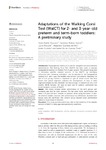Adaptations of the Walking Corsi Test (WalCT) for 2- and 3-year-old preterm and term-born toddlers: a preliminary study

Ver/
Use este enlace para citar
http://hdl.handle.net/2183/32935
A non ser que se indique outra cousa, a licenza do ítem descríbese como Creative Commons Attribution 4.0 International Licence (CC-BY 4.0)
Coleccións
- Investigación (FCS) [1293]
Metadatos
Mostrar o rexistro completo do ítemTítulo
Adaptations of the Walking Corsi Test (WalCT) for 2- and 3-year-old preterm and term-born toddlers: a preliminary studyAutor(es)
Data
2023-03-17Cita bibliográfica
Martín-Pozuelo N, Robles-García V, Piccardi L, Quintela Del Rio A, Cudeiro J, De Las Cuevas-Terán I. Adaptations of the Walking Corsi Test (WalCT) for 2- and 3-year-old preterm and term-born toddlers: a preliminary study. Front Pediatr. 2023 Mar 17;11:1081042.
Resumo
[Abstract] Introduction: Topographical memory is crucial for navigation and environmental representation. The Walking Corsi Test (WalCT) has been used to evaluate topographical memory in children from 4 years upward. The present study aims to determine whether adapted versions of the WalCT- by simplifying instructions and increasing motivation- can be adopted to test topographical memory in 2- and 3-year-old toddlers born at term and preterm. Assessing this skill in such young children is important in light of recent studies that have shown how spatial cognition underlies the development of skills in other cognitive domains as well. Methods: For this purpose, 47 toddlers (27.39 ± 4.34 months, 38.3% females), 20 born at term and 27 preterm, performed two aimed-designed versions of WalCT.
Results: The results showed better performance of the term groups with increasing age and for both versions. On the other hand, performance was better in 2-year-old term toddlers vs. preterm. When rising motivation, 2-year-old preterm toddlers improve their performance but differences between both groups were still significant. The preterm group showed lower performance related to lower levels of attention.
Discussion: This study provides preliminary data on the suitability of the adapted versions of WalCT in early ages and prematurity conditions.
Palabras chave
Child development
Locomotion
Premature infant
Selective attention
Spatial navigation
Toodler
Locomotion
Premature infant
Selective attention
Spatial navigation
Toodler
Versión do editor
Dereitos
Creative Commons Attribution 4.0 International Licence (CC-BY 4.0)
ISSN
2296-2360






